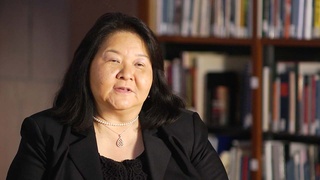Interviews
Identity (Japanese)
(Japanese) You know, well, I look back now on those times and… you know how people talk about their motherland, or homeland, right? Well, let’s see, of course that has to be my six, seven years spent in the US—the six or seven years after being born there, right? But then I went to Japan, and went through elementary and junior high school there. So there’s this, you know, the education, the environment that I grew up in and such [in Japan]. So actually, if asked whether identify myself as American or Japanese—at the time, I’d have to say that I saw myself as Japanese, and didn’t consciously identify as being an American.
…It’s called dual-citizenship—I had both American citizenship and Japanese citizenship. So the Japanese would say to me, “You’re American,” but since coming to Japan and living here, I felt, and my mother likewise felt, that we would never really be going “back” to America. I think we had a stronger feeling toward completely identifying ourselves as Japanese.
Date: June 17, 2008
Location: California, US
Interviewer: Yoko Nishimura
Contributed by: Watase Media Arts Center, Japanese American National Museum
Explore More Videos




Postwar school-life
(b. 1930) Half Japanese and grew up in both Japan and the United States.

On Challenging Institutions
(1938-2020) Japanese American attorney and civil rights activist

Pop and Balls
(1938-2020) Japanese American attorney and civil rights activist

Re-examining Identity
(1941-2018) Japanese Canadian photojournalist and activist


The Nomo Tornado in 1995 (Japanese)
Producer at NHK Cosmomedia America, Inc.



Conflicted about immigrating to America (Japanese)
(b. 1925) War bride

Why I’m glad I immigrated to America (Japanese)
(b. 1925) War bride

Defining "Nikkei"
(1941-2018) Japanese Canadian photojournalist and activist

Returning to Japan after studying in New York
(1940-2016) Issei Landscape Architect
